Sat 25 Jun 2016
Movie Review: STOP ME BEFORE I KILL! (1960).
Posted by Steve under Crime Films , Reviews[3] Comments
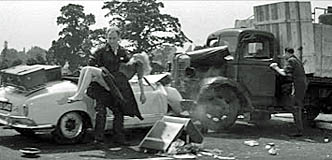
STOP ME BEFORE I KILL! Falcon/Hammer Films, UK, 1960, as The Full Treatment. Columbia Pictures, US, 1961. Claude Dauphin, Diane Cilento, Ronald Lewis, Françoise Rosay. Screenplay: Val Guest and Ronald Scott Thorn, based on the latter’s novel The Full Treatment. Director: Val Guest.
There is a quite a bit that may be of interest to regular readers of this blog in this film, recently released as one of a box set of non-horror Hammer films. The cinematography by Gilbert Taylor is clear and crisp, in stunning black-and-white, and the performances by all are as top notch as the script will allow them to be, especially that of leading lady Diane Cilento.
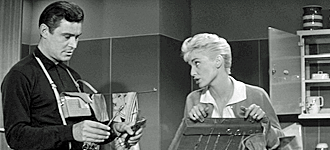
She plays the wife of a race car driver (Alan Colby, played by Ronald Lewis) who was in an auto accident on an ordinary highway while the two of them were on their honeymoon together. He’s recovered but is having (apparently) trouble in bed with her. While in France, then back to England, they call on the services of a psychiatrist named Prade (Claude Dauphin).
The problem is more than a mere sexual dysfunction, however, and here’s where that rather title of the film comes in. What Colby also has to fight is a compulsion to kill his wife, mostly by strangulation, either manually or with whatever wire in the kitchen is handy. They also live in an apartment with, for no other apparent reason, a set of old surgical tools.
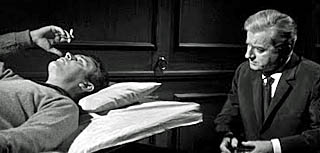
Commenters on IMDb, some of them, have complained about the length of the movie, and suggest that it should have been shorter in order to maintain the level of suspense the producer and director of the film intended it to have. They, the commenters, are right, but the US version, the one I’ve just watched, is already missing 15 minutes from its original two hour length in the UK.
And what’s worse, one key scene is missing, one referred to later as the shower scene, in which (apparently) the newly married couple try to make love, and can’t. The next scene, also crucial to the movie, takes place at a dinner party being held by Prade, where Colby takes serious offense at several of Prade’s jabbing and jesting remarks.
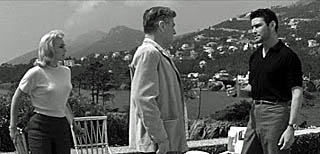
Strangely, though, a scene in which Diane Cilento’s character is seen swimming in the nude is left intact, but filmed discreetly at a distance so as not to bother (?) the censors.
But the major problem is that, even by cutting the film (or script) down to size, there is no real suspense. Everything is well foreshadowed in advance (is that redundant?), and the viewer’s only obligation is to fit all the pieces together as they occur into the ending that is already well established ahead of time.
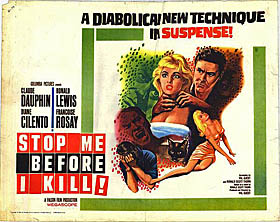
June 25th, 2016 at 10:07 pm
In many ways, the (SPOILER ALERT) villain of the movie, as portrayed by Claude Dauphin, is a much richer and more compelling character than that of the film’s protagonist
June 26th, 2016 at 1:41 am
Just a note, but at the time Cilento was still Mrs. Sean Connery so this was likely filmed while he was still doing DR.NO.
The book by Ronald Scott Thorn, and the one that follows it, are both much more concerned and interested in the psychology of the thing than just a suspense novel, and since Thorn co wrote the screenplay I’m sure he tried to get that into it. They are very much along the line of a Winston Graham novel.
I enjoyed both books though in both cases how it was going to work out was fairly obvious once the main idea was laid out.
Part of the problem is that Lewis, while a good enough leading man, isn’t quite up to this (Guest used him more effectively in JIGSAW a year after this)kind of role. In the hands of Michael Craig, Kiernon Moore, or another British leading man of the period it all might have been worked a bit better. As is Cilento and the estimable Dauphin both tend to act him off the screen even though he should have all the best material.
I suspect the longer running time would be more palatable in the hands of an actor with more screen presence than Lewis.
June 27th, 2016 at 12:00 am
I wrote this review back in April of last year. It’s been in the hopper ever since. I remember Diane Cilento, as I predicted I would in my first paragraph, but Jon and David, both of you are right. I could picture Dauphin perfectly in the role as soon as I started to post the review. Ronald Lewis I didn’t remember at all, not until I started looking for images to add.